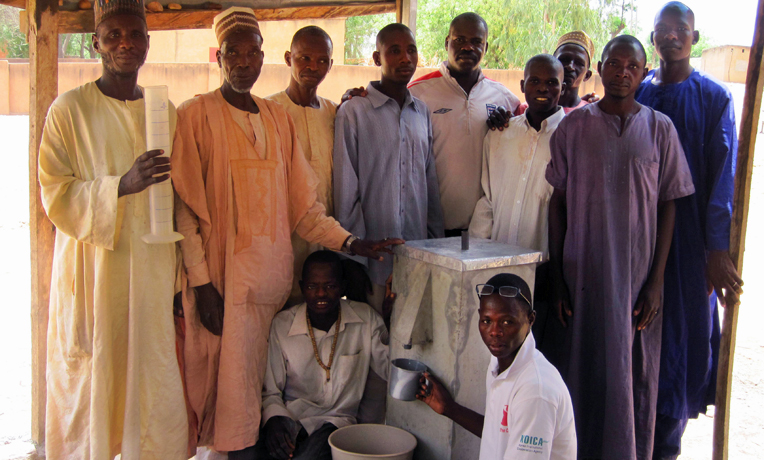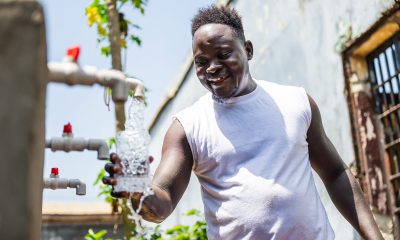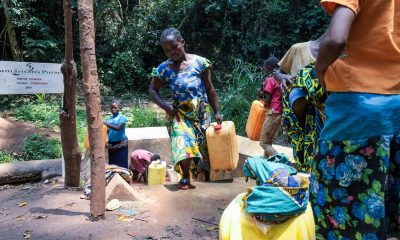A Samaritan's Purse staff member discusses what he has learned and accomplished while working in Niger
Amanda Patterson is a communications intern for Samaritan’s Purse in Niger.
One of the most remarkable things about interning abroad in a place where life is not always easy is being able to watch and learn from the staff. Some of these people have lived in their respective countries for a number of years, committing their lives and their families’ lives to working for God’s greater good.
Simply put, the Samaritan’s Purse staff members who run the projects that we read and hear about are giving up a lot of themselves to be here. And they happily do so.
These people are talented, humble, and inspirational. They are using their gifts here in Niger and elsewhere around the world because God called them to these places.
Olivier Boutchueng is one such staff member. His educational and professional background is in engineering, and his unique calling brought him to Niger first as an intern and then as the manager for a water filter project.
Here is Olivier’s story as a water engineer living in Niger.

Olivier teaches a community about the importance of hygiene and using clean water.
AP: What was your background before joining Samaritan’s Purse Niger?
OB: I grew up in Cameroon and attended university where I studied natural sciences for six years. During those years, I developed a passion for applied mechanics and hydraulics, both of which I eventually specialized in. I went on to complete my master’s degree at an engineering school in Burkina Faso and came out as a water and environmental engineer. With a growing desire to apply my skill sets within communities that are in the most need, I felt led to work in the humanitarian field. So I completed a second master’s degree in humanitarian water, sanitation, and hygiene management at the same engineering school.
AP: How did you then come to find Samaritan’s Purse?
OB: I discovered Samaritan’s Purse in 2012 while doing a web search. I was looking for professional career opportunities with an international, evangelical, non-governmental organization whose goal is to fulfill the Great Commission, to share the Good News of salvation in Jesus Christ through faith. I immediately applied for the water, sanitation, and hygiene intern position, and around 6 months later I was hired for the office in Niger. And that’s how my story with Samaritan’s Purse started.
AP: What is your current role with Samaritan’s Purse?

Olivier also goes out into communities to teach people and give them tools for better lives.
OB: I work with Samaritan’s Purse in Niger as the Bio-Sand Filter Project Manager. The household filter project came about through the request of another organization operating in Niger. Samaritan’s Purse’s role is to provide technical assistance to the partner so that they can introduce and build these filters in the villages where they work. My role is to facilitate, intervene, and provide technical knowledge so that the partner’s staff can learn how to build, manage, and use these filters in the targeted communities.
AP: What does a typical month look like for you?
OB: Each month, my field team and I meet together to complete a plan of activities that are to be performed on the field, as well as to fill out and submit material and financial assessment needs. I make a monthly visit to the field in order to ensure that all planned activities are being faithfully executed, as well as to take note on any new difficulties encountered while performing these activities. The goal is to always find a quick and appropriate solution after meeting with the partner organization. At the end of the month, I file financial and project activity reports.
AP: Could you give an example of a past project that was successful and a good representation of the work Samaritan’s Purse does with water, sanitation, hygiene, and household water filters?

Olivier tests water in a community.
OB: In the last two months of my internship, in mid-2013, I had the opportunity to manage an emergency project. We were needed to help fight the spread of a cholera epidemic that had broken out in the Tillaberi region. We helped by educating people, distributing prevention kits, training safety teams, and disinfecting.
Samaritan’s Purse provided several staff members, including a project manager, a field supervisor, and two field outreach workers, to ensure that this project was completed. The epidemic was successfully stopped with the help and contribution of other organizations, local authorities, and health workers in the region. The cholera intervention also had a big impact in the community, especially in the village of Ayorou, and left results we can still see today: the villagers regularly practice hand washing, they treat their drinking water before consumption, and they make greater efforts to make sure that their environment is clean.
AP: What advice would you give to somebody looking to use their scientific/engineering skills in the humanitarian field?
OB: As in any professional sector, you need to have passion in conjunction with patience and wisdom. So my advice for anyone looking to enter into this field is to know your role and the role of your colleagues, know your skill sets and those of your colleagues, know your limits and theirs, and lastly your weakness and theirs. Be ready to learn from others and to teach others what you know. Be ready to develop a team spirit because this field is a mix of both individual and collective collaboration.
AP: Lastly, what is it that God is teaching you while you work at Samaritan’s Purse? How have you grown spiritually since working on these projects?
OB: During my time at Samaritan’s Purse in my current function, God has taught me His patience, His mercy, His wisdom, His justice, and humility through my work relationships. Since I arrived at Samaritan’s Purse, I haven’t stopped growing each and every day thanks to these work relationships. “As iron sharpens iron, so a man sharpens the countenance of his friend,” (Proverbs 27:17, NKJV).








